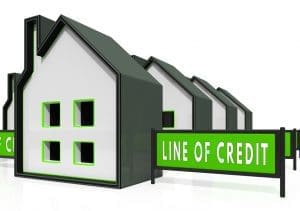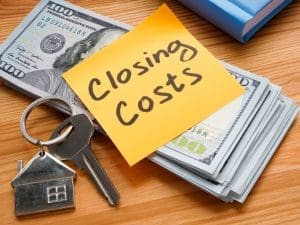So you want to apply for a home equity loan to tap some of your hard-earned equity. Keep in mind that every mortgage, whether it is a home equity loan or HELOC, has closing costs. The only question is how much home equity loan closing costs and lending fees will be and how they will be paid.
- Shop Lenders for No Closing Costs on HELOCs and Home Equity Loans
- Negotiate Fees and Loan Costs on Competitive Fixed Rate Loans and HELOC
- Compare Equity Loan and HELOC Closing Costs
Let’s dig into this complex topic below! If you have questions about home equity closing costs or want to apply for the best HELOC, reach out to use at the RefiGuide today.
Are There Closing Costs with a Home Equity Loan?
Closing costs for home equity loans and HELOCs cover the expenses and time of various stakeholders in the loan process. Common second mortgage and home equity loan charges and estimated lending fees are as follows:
- Appraisal fee: $300 to $700
- Underwriting fee: $195 to $395
- Credit report fee: $75 to $100
- Loan origination fee: .5% or 2% of the amount of the loan
- Processing fee: $195 to $495
- Title insurance fees: .5% of the home equity loan amount
- Attorney fee: Roughly $200 or $300 per hour
- Settlement fee: Various fees
- Appraisal fee: $400 to $700
More about some of these home equity loan and HELOC fees are below:
Appraisal
A home appraisal is a professional opinion of the value of your home. Most home equity loan lenders will mandate an appraisal when you apply for a home equity loan or HELOC. They want to make sure the home is worth what they think before extending credit. If you don’t pay the loan and they have to foreclose, they may be able to sell the property to get their money back.
Traditional appraisals cost between $400 and $700. But the price will vary on location, size of the home, and any unique features of the property. There are a few banks and credit unions that offer a HELOC without an appraisal fee. We suggest verifying whether or not the interest rate is lower if you pay for the appraisal yourself.
Credit Report Fee
When you apply for an equity loan, your lender will get a credit report from the major credit bureaus. The lender wants to know what your debts and payment history are like. If you have a low credit score under 620, it could be more difficult to get a 2nd mortgage or equity loan. The credit report fee is a 3rd-party cost but some lenders may be willing to waive it.
Origination Fee
The home equity loan origination fee pays for your lender’s costs to process the loan and go over your financial details. It pays for loan officers and underwriters to handle the loan. Some lenders will charge a flat $99 fee instead of a percentage.
Underwriting Fee
Since this is a 2nd lien transaction, most banks and lenders will assign an underwriter to oversee the home equity loan application and HELOC funding process.
Title Insurance
Title insurance covers the lender from any disputes that come from who owns the property. There also is a title search to ensure they are no title issues or liens and home equity line transactions. Most lenders will not negotiate the title search fee =, but it never hurst to ask.
Attorney Fee
Many states require you to have a real estate attorney handle the closing. The attorney goes over the loan documents to ensure they are in order. Attorney fees are typically up to $500 to $750. In some states like New York or Washington DC, you may see increased attorney fees and closing costs on HELOCs, so check around.
Processing Fee
Most small HELOC and loan amounts will not have processing fees. However the high LTV second mortgages and low-credit home equity loans will need a processor as the process is more complex. In these instances the home equity loan company will likely charge between $195 and $495 for processing fees.
Settlement Fee
This fee deals with paying the settlement, title, or escrow company for writing and filing the closing documents, recording the mortgage with the county government, and writing the loan settlement statement.
Notary Fee
Most lenders will charge a signing fee if you want a notary of the public coming to you to finalize the closing documentation. Sometimes if you get the documents notarized at the escrow office, the lender will waive the notary fee.
Annual Fee
Many banks and credit unions will extend an annual fee for HELOCs. Many lenders will waive this cost if you actively draw on your HELOC account.
The home equity financing costs vary by lender and state.
HELOC Closing Costs and Fees
If you get a HELOC line instead of an equity home loan, it is similar to a credit card but uses your equity as the credit line.
People ask us all the time, “Does HELOC have closing costs?” People say advertisements from banks and credit unions that boast of no HELOC closing costs.
After researching these claims, we usually find the these banks are targeting borrowers with very high credit scores or small loan amounts.
If you have a credit score over 700 and you do not need more than $25,000, then there are a handful of banks offering a HELOC with no closing costs or origination fees. Overall, there are not that many options to get a HELOC with no closing costs.
You will usually pay 2% to 5% of your loan amount to the similar fees charged for a home equity financing. These fees were covered previously in this article.
However, some of the best HELOC lending sources may not charge closing costs for a HELOC credit line if you have a very low loan to value ratio and high credit score.
The closing costs for HELOC loans could be rolled into the cost financing or reflected in the interest rate. Sometimes lenders will reduce closing costs and waive the application fee for home equity loan refinancing.
Take advantage of the RefiGuide system that enables consumers to shop and compare HELOC closing costs from top lenders online.
How to Lower Your Home Equity Loan or HELOC Closing Costs
There are several ways to reduce the costs of tapping your equity with a HELOC or home equity loan. Banks and lenders are out to make money but they may negotiate closing costs and waive HELOC fees in an effort to not lose your business
Many banks are eager to assist you, so don’t hesitate to shop around for the best rate and terms.
Consider obtaining quotes from at least three different lenders to determine which one best meets your needs and goals.
Be sure to compare the HELOC pre-approvals and good faith estimates and to each for accurate comparisons.:
Borrow Less Equity
Fees for home equity loans and HELOCs are based on the size of the loan. The less equity you borrow, the lower the fees. You should usually not borrow the maximum amount; only borrow what you need. If you qualify for 80% equity of your $300,000 home and owe $100,000, you might borrow up to $160,000. But that will have a high payment and closing costs could be 2% to 5% of that amount. Borrow less if you don’t need that much.
Use A No-Closing-Cost Lender
There are some lenders offering no-closing cost home equity loans and HELOCs. You should carefully review the fine print because the lender makes up their fees somewhere. The closing costs could be rolled into your loan, or the rate may be higher. Another possibility is taking out a no cost home equity loan with a bank that you work with often. They might offer a no closing cost HELOC or equity loan. Always read the fine print as many banks advertise zero closing cost home equity loans but in many cases they may require a 760 credit score or an loan to value under 80% CLTV.
Use Autopay
Lenders may waive many home equity loan costs if you let them auto draft payments from your account. You also could score a discounted rate.
Home Equity Closing Cost Tax Deductions
Are home equity closing costs tax deductible? Generally, the answer is no. The only closing costs from a mortgage that can be tax deductible is when you pay points to reduce your interest rate. However, the interest paid on a HELOC or home equity loan is tax deductible if the cash obtained is used to improve the value of the home.
Can You Negotiate Home Equity Loan Closing Costs?
Yes, second mortgage closing costs are frequently negotiated. The origination fee, credit report fee and processing fees can be negotiable with some mortgage companies. Some lenders will try and recoup their HELOC closing costs with a flat fee as well. There is not usually an annual fee with a fixed equity loan, but many banks will charge HELOC annual fees, so be on the look out to negotiate transaction fees and points when you are shopping lenders online. It is possible to find a no closing cost home equity loan and the RefiGuide can match you with lenders that advertise low closing cost HELOCs and 2nd mortgages with competitive interest rates.
When Should You Apply for a Home Equity Loan or HELOC?
Begin by obtaining quotes from several lenders. Compare the interest rates, monthly payments, and initial costs of each proposal to determine the best overall deal for you.
Many people are in a holding pattern to apply for a home equity loan or HELOC as they wait for interest rates to slide. In October 2024, the Federal Reserve indicated another rate cut could be coming soon. Since the popularity of home equity financing has surged, we haven’t seen as many banks advertising the no closing cost equity loan because of simple supply and demand economics.
Inflation is still elevated and lowering rates could cause more inflation. However, the Fed stated that a next move won’t be a rate increase.
Generally, home equity interest rates are not expected to change significantly for the rest of 2024. We could see another significant rate cut in early 2025, but the Federal Reserve’s next meeting bears close watching.
The home equity loan application process is straightforward and fast. If you have any questions, feel free to reach out to the RefiGuide either by phone or online message for help. Compare HELOC vs home equity loan.
Case Study 1: Finding a Lender with Lower HELOC Fees
Scenario: Mark and Lisa, homeowners in California, needed a $100,000 home equity loan to renovate their kitchen. Their bank quoted $4,000 in closing costs (4% of the loan amount). Instead of accepting the offer, they compared three other lenders.
Outcome: One online lender offered $2,500 in closing costs, a significant reduction. By switching lenders, Mark and Lisa saved $1,500, making their renovation more affordable.
Case Study 2: Negotiating a No-Closing-Cost HELOC Loan
Scenario: Sarah, a Florida homeowner, wanted to consolidate high-interest debt with a $75,000 home equity loan. Her lender quoted her $3,000 in closing costs.
Outcome: Sarah negotiated with the lender, leveraging her strong credit score (780) and history as a loyal customer. The lender agreed to waive the origination fee, reducing her closing costs to $1,500. This allowed her to access funds with minimal upfront expenses.
No Cost Home Equity Loan and No Closing Cost HELOC Opportunities
Before you apply for a home equity line of credit or equity loan, it’s important to understand the impact that closing costs can have on the cost of borrowing.
There are some ways, however, that you can either reduce or eliminate this expense.
It’s important to point out that not all lenders charge closing costs on their home equity loans.
The RefiGuide can introduce you to competitive lenders that offers HELOCs and home equity loans without closing costs.
Take some time to explore the possibility of securing a no closing cost home equity loan before you commit to paying fees and home equity closing costs.
If you do research you can find home equity loans that do not require closing costs. However, it’s likely that you will face a higher HELOC interest rate compared to paying the fees upfront. This could lead to paying significantly more in total to your lender over the duration of the loan. We always recommend attempting to qualify for a no closing cost home equity loan or HELOC as long as you are comfortable with the interest rate.
More Frequently Asked Questions:
Why Is the Interest Rate Higher on a HELOC with No Closing Costs?
Typically, no closing cost home equity loans and HELOCs have a higher interest rate than a HELOC if a borrower pays for the closing costs. The no cost HELOC has a higher rate because the bank or lender still has to pay the third party closing costs, like appraisal, title, escrow, underwriting, notary and processing. With every home equity line of credit there is a lot of work that goes into the loan. So, lenders offering no closing cost HELOCs are paying the closing costs and making their money by charging a slightly higher interest rate.
How fast can I get a no-closing-cost HELOC?
The approval process for a no-closing-cost HELOC can take anywhere from a few days to several weeks, depending on the lender and your financial profile. Some lenders offer fast approvals within a few days, while others may take up to 30 days for processing, underwriting, and funding. Providing accurate documentation can help speed up the process.
Are HELOC closing costs negotiable?
Yes, HELOC closing costs are often negotiable. Some lenders waive or reduce fees, especially if you have strong credit or an existing relationship with the bank. Typical costs include application fees, appraisal fees, and origination charges. Shopping around and comparing offers can help you find lenders that offer lower or no closing costs.
Are there always closing costs on a home equity loan?
Not always. While many home equity loans come with closing costs—such as appraisal, origination, and title fees—some lenders offer promotions that waive these costs. Additionally, you may be able to negotiate certain fees or roll them into your loan. Comparing lenders and asking about fee structures can help you minimize or avoid closing costs.
Do you have to have a closing for a home equity loan?
Yes, home equity loans require a closing, but the process is usually simpler than a traditional mortgage closing. You’ll need to sign loan documents, review terms, and finalize details with your lender. Depending on state laws and lender policies, closings may take place in person or remotely, and they generally involve fewer parties than a home purchase closing.
What Is a HELOC Line of Credit?
A HELOC is a variable interest line of credit with your equity as the credit line. The interest rate varies, and you pay interest only during the 10-year draw term. You pay interest and principal when the draw period ends. The credit line can be repaid and reused as much as you like. HELOCs are a good fit for someone who has several projects to pay for. Remember, with a home equity line, you only pay interest on the money taken out of the HELOC.
A HELOC is often preferred by someone who wants a variable rate but understands the rate could move higher. They also may prefer to take money out in stages and pay less interest. Find out wat the minimum credit score for a HELOC is today.
What Is a Fixed Home Equity Loan?
A home equity loan is a second mortgage with a fixed rate and term. In spring 2024, CBS reported fixed home equity loan rates averaging about 9%. The home equity installment loan is a lump sum loan and you get the cash all at once. It may be a good option for someone with one, large expense to cover, such as credit card debt or a large medical bill.
A home equity loan is a good choice for someone with one, large expense to cover. The person also probably prefers economic certainty with a fixed rate and fixed monthly payments.
How is HELOC Interest Calculated?
Since the balance of a HELOC can fluctuate daily due to draws and repayments, interest is calculated daily rather than monthly. For a 7% HELOC, the daily interest rate is calculated by dividing .07 by 365. This daily interest rate is then multiplied by the average daily balance throughout the month.
How Does Paying Back HELOC Work?
Once the HELOC draw period ends, the revolving line of credit transitions to the repayment period. During this time, you can no longer borrow against the line of credit, and you will begin repaying back the portion of credit line you used. Monthly payments will include both principal and interest and will typically be spread over a specified term, ranging from 10 to 20 years.
Is Freddie Mac Backing 2nd Mortgage Loans?
There is a significant proposal on the table for Freddie Mac to begin buying second mortgage loans (including home equity loans and HELOCS) on the secondary market. This could make home equity loan rates lower as the market would be more competitive.
Popular Home Equity Financing Alternatives
Consumers all over the United States are borrowing money to consolidate debt, finance home improvements and invest in in real estate. The are other loan options besides a fixed equity loan or HELOC if they don’t meet your needs. Consider a cash out refinance if your existing mortgage rate is above 6%. The personal loan continues to a popular choice for people that need a small loan amount or want to get cash out without using their home as collateral. The home equity investment program is another option to consider if you have a lot of equity and see the benefit of not having to make a mortgage payment every month.
Key Takeaways on Home Equity Loan and HELOC Closing Costs
While the average closing costs for a home equity loan or line of credit typically range from 2-5% of the total home equity loan amount, similar to primary mortgages, they are often considered more simple, because they borrower already owns the home. There are usually closing costs on HELOCs and equity loans, but in some cases they are negotiable. If you have more than 20% equity in your home, have the ability to document your income and good credit scores, the home equity loan closing costs can be negotiated.
Just remember that closing costs vary from lender to lender but can include fees for appraisal, documentation, application, legal services, and more. Be sure to compare closing costs between banks, credit unions and lenders, as well as potential fees and pre-payment penalties not associated with closing the loan. Always try and negotiate points, origination fees, transaction fees, annual fees, and early termination fees.
Home equity and HELOC closing costs are usually part of life. But if you shop around and consider many options, you may be able to save on closing costs. Look at many loan options with various lenders to see which offers the best rate and lowest costs. You can talk the participating lenders at RefiGuide.org today to find the best home equity loans and HELOCs with low closing costs and interest rates that make sense.




